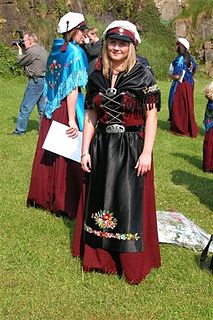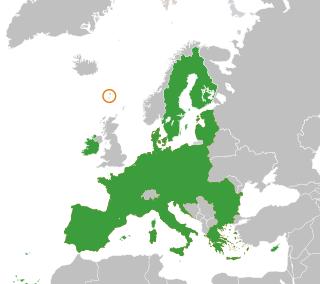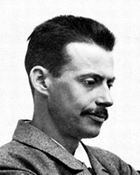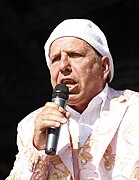
This article is about the demographic features of the population of the Faroe Islands, including population density, ethnicity, education level, health of the populace, economic status, religious affiliations and other aspects of the population.
The politics of the Faroe Islands a "constituent country" of the Kingdom of Denmark, function within the framework of a parliamentary representative democratic dependency, whereby the Prime Minister of the Faroe Islands is the head of government, and of a multi-party system. The Faroe Islands are politically associated with the Kingdom of Denmark, but have been self-governing since 1948. Executive power is exercised by the government. Legislative power is vested in both the government and the Løgting. The judiciary is independent of the executive and the legislature and the responsibility of Denmark. As of October 25, 2007, the Faroe Islands became one electoral district.

The economy of the Faroe Islands was the 166th largest in the world in 2014, having a nominal gross domestic product (GDP) of $2.613 billion per annum.

The flag of the Faroe Islands is an offset cross, representing Christianity. It is similar in design to other Nordic flags – a tradition set by the Dannebrog of Denmark, of which the Faroe Islands are an autonomous country.

The Løgting is the unicameral parliament of the Faroe Islands, an autonomous country within the Danish Realm.

The Faroe Islands, or Faroe(s), are an island group situated between the Norwegian Sea and the North Atlantic Ocean, approximately halfway between Scotland and Iceland. The Faroe Islands are an autonomous country of the Danish Realm.

The Faroe Islands national football team, represents the Faroe Islands in association football and is controlled by the Faroe Islands Football Association. The Faroe Islands became a member of FIFA in 1988 and UEFA in 1990 and is the fourth smallest UEFA country by population.

Faroese people or Faroe Islanders are a North Germanic ethnic group and nation native to the Faroe Islands. The Faroese are of mixed Norse and Gaelic origins. About 21,000 Faroese live in neighbouring countries, particularly in Denmark, Iceland and Norway. Most Faroese are citizens of the Kingdom of Denmark, in which the Faroe Islands are a constituent nation. The Faroese language is one of the North Germanic languages and is closely related to Icelandic and to western Norwegian varieties.
The króna is the currency of the Faroe Islands. It is issued by Danmarks Nationalbank , the central bank of Denmark. It is not an independent currency but a version of the Danish krone. Consequently, it does not have an ISO 4217 currency code and instead shares that of the Danish krone, DKK. The króna is subdivided into 100 oyru(r).

Lesbian, gay, bisexual, and transgender (LGBT) rights in the Faroe Islands are relatively similar to that of Denmark. The progress of LGBT rights has been slower, however. While same-sex sexual activity has been legal in the Faroe Islands since the 1930s, same-sex couples never had a right to a registered partnership. In April 2016, the Løgting passed legislation legalizing civil same-sex marriage on the Faroes, recognizing same-sex marriages established in Denmark and abroad and allowing same-sex adoption. This was ratified by the Folketing in April 2017. The law went into effect on 1 July 2017.

The term "the unity of the Realm" refers to the relationship between Denmark proper, the Faroe Islands and Greenland—three countries constituting the Kingdom of Denmark.

The following outline is provided as an overview of and topical guide to the Faroe Islands:

The Faroe Islands, a self-governing nation within the Kingdom of Denmark, is not part of the EU, as explicitly asserted by both Rome treaties.

Høgni Reistrup is a Faroese singer, musician, writer and scientist from Tórshavn, Faroe Islands. He is the co-writer of the book Exit Føroyar ; he wrote it together with Heri á Rógvi. The books was published in 2012 and created a major debate in the Faroe Islands and in Denmark about the problems the Faroe Islands were facing with population decline in the islands, where the biggest problems seemed to be that half of the young people who moved away to study abroad never moved back again; especially the women did not move back again. After a period of six years with negative net migration in the Faroe Islands, the country saw an increase in the population in 2014 and 2015.
The Cabinet of the Faroe Islands has been the chief executive body and the government of the Faroe Islands since the islands became self-governing in 1948. The cabinet is led by the Prime Minister (løgmaður). There are around 7 members of the Cabinet, known as "Ministers", all of whom are also heads of specific government ministries. The ministers are appointed by the Prime Minister. The Faroese government currently consists of seven ministers including the Prime Minister.

The Faroese independence movement or the Faroese national movement is a political movement which seeks the establishment of the Faroe Islands as a sovereign state outside Denmark. Reasons for complete autonomy include the linguistic and cultural divide between Denmark and the Faroe Islands as well as their lack of proximity to one another; the Faroe Islands are about 990 km from Danish shores.
The levels of education in the Faroe Islands are primary, secondary and higher education. Most institutions are funded by the state; there are few private schools in the country. Education is compulsory for 9 years between the ages of 7 and 16.
Faroese Americans are Americans of Faroese descent or Faroe Islands-born people who reside in the United States. The Faroe Islands are a group of eighteen islands between Iceland and Norway, and they are a part of the Kingdom of Denmark. There are approximately 50,000 Faroese people living in the Faroe Islands today. It is not known how many Faroese Americans there are.















